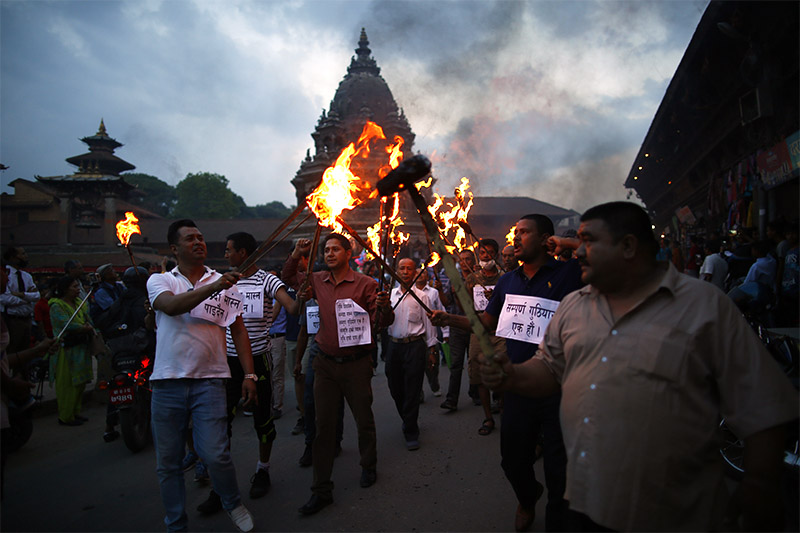Newars continue protests against Guthi Bill
Kathmandu, June 14
Locals and stakeholders continued their protests holding torch rallies and mass gathering in different parts of Kathmandu valley, today.
The general public, especially people from Newar community, have taken to the streets demanding the withdrawal of the controversial Guthi Bill, which they say has provisions in favour of land mafias and is against cultural conservation.
Today, the protesters took out a massive torch rally in Mangal Bazaar, Lalitpur, at 6:30 pm. The protesters had held a mass gathering at Tokha at 6:30 am in the morning, followed by a similar event at Dhalku at 5:00 pm. There were also protests in other parts of the valley.
Tomorrow, the protesters plan to take out a rally at Budhanilakantha at 10:00 am, and in Bhaktapur at 4:00 pm. A massive rally, beginning from Basantapur, has been planned at 6:30 pm tomorrow, according to Ganapati Lal Shrestha, coordinator of National Identity Protection Joint Struggle Committee that has spearheaded the protests. Yesterday too, the operators and locals staged protests in Kirtipur, Banepa, Dhulikhel and Pokhara, with a massive one at Patan Durbar Square.
Shrestha said they would continue their protests until the government withdrew the bill to draft a fresh one in consultation with guthi trustees, farmers, experts and other stakeholders from across the country.
“We are not against formulating a strong law to curb anomalies in the sector, neither are we against the formation of Guthi Authority,” he said, adding, “But the existing bill does not address actual problems faced by guthis.”
Stakeholders say the bill’s provision that allows anybody who has occupied guthi land to acquire ownership certificates will only favour land mafias, severely hurting income source of guthis that work to conserve religion, culture and tradition. They say a cash-strapped guthi could not organise jatras and other cultural and traditional functions. The bill also nullifies all guthi property-related evidences including those received through donations.
The bill has a provision that brings all private, public and raj guthis under the proposed Guthi Authority, effectively ending the role of existing trustees who have so far been running the guthis. The bill proposes appointing government employees to run guthis.
“Do you think a government clerk will work for the conservation of culture?” asked Shrestha, adding, “Guthi trustees are the ones who have been working to save our identity, so it’s the state’s duty to protect them.”
Another negative impact of converting private guthis into public guthis, according to stakeholders, would encourage guthi land grab through tenant (mohi) claims, which would again favour land mafias. Moreover, this is against the right to property guaranteed by the constitution, according to Shrestha, because these are personal property that has been donated by families to conserve family culture and tradition.
Another issue raised by protesting stakeholders is the bill’s provisions that give sweeping powers to chief trustees (mathadhees and pujaris), which increases the chances of misuse/ grab of guthi land in collusion with chief trustees. They are of the view that there has to be a check-and-balance system when it comes to appointment and delegating authority of chief trustees.
Shrestha also said one blanket law would not address the issue because problems related to guthis in Kathmandu were different from the problems related to guthis in other parts of the country. “So we want this law to be drafted in consultation with stakeholders,” he said.
According to Guthi Sansthan, raj guthis have an estimated 66,000 bigha land in the Tarai, and around 561,000 ropani in hills. There are around 2,335 registered raj guthis. Although private guthis are not registered with the Sansthaan, it estimates their number to be in excess of 5,000.






